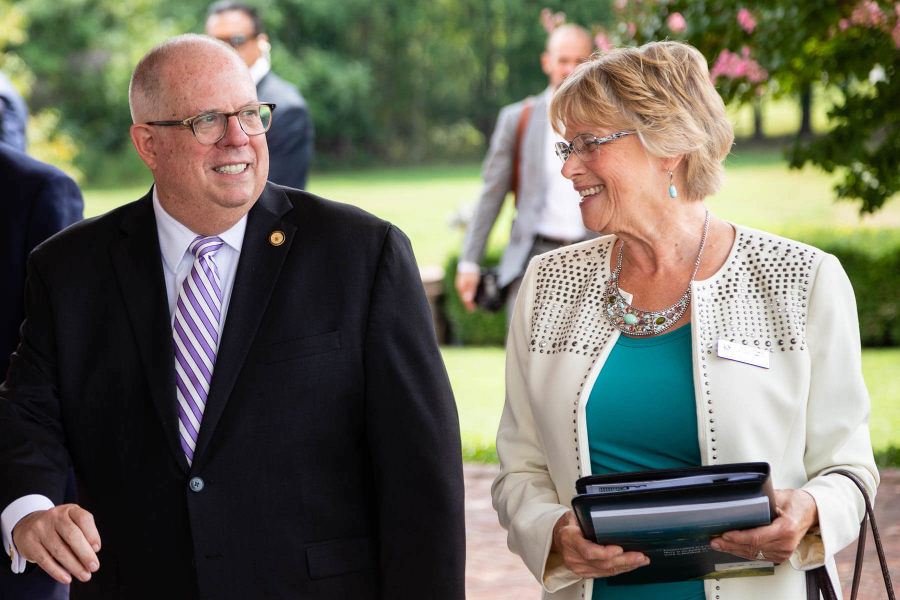Chair, second time running!

As she happily enters into her second term as chair of the Chesapeake Bay Program’s Local Government Advisory Committee (LGAC), Ann Simonetti, former councilmember to Marysville Borough in Pennsylvania, reflects on her past years in LGAC and hopes for the future. “I found it to be less stressful than I thought it would be,” she joked, adding that she finds enjoyment in her position while having the ability to stay informed on the latest information and developments happening within Pennsylvania and around the entire Chesapeake Bay region.
Simonetti has always had a connection to the Chesapeake Bay, even as a Pennsylvania native. She learned early on about the connection between the Bay and the Susquehanna River. Every year, she and her family would follow the river to the Bay where they would enjoy an outing of swimming and picnicking on the beach. Once elected to the Marysville Borough Council, Simonetti began to better understand the need to restore the Bay. “Getting local residents to understand the overwhelming task before them took educating myself to realize that we all want and need clean water locally.” She mentioned, “this understanding in turn assists downstream, into the Bay and beyond.”

Having served as a governor-appointed member of LGAC since 2004, and as chair since 2019, Simonetti has had the opportunity to understand local elected and appointed officials, as well as their vast range of community-driven and environmentally restorative priorities. Using the example of how communities in Pennsylvania are bordered by the Susquehanna River, she states that, “many river towns deal with constant flooding after a significant rainfall, presenting a need for remediation, at the expense of the local government. This is not parochial to Pennsylvania, as other government entities experience this same costly remediation as well.” In her attendance at local, regional and cross-program meetings, she appreciates the ability to explore such local priorities, including those that differ from her inland, rural background. “It's always so self-fulfilling to help so many people,” she said proudly.
Reflecting on her long-term membership in LGAC, Simonetti spoke to how the advisory committee has fostered her understanding of multiple local perspectives. “The entire committee faces the same end-product goal in their respective jurisdictions,” she says. “Being able to share the ideas of what has worked in other jurisdictions and, in some situations, retrofitting them to our local goals, is extremely helpful.”
Simonetti holds a fond memory of representing LGAC at the 2019 Chesapeake Executive Council Meeting, where she was able to present environmental and policy related recommendations on their behalf to members of the Executive Council, including Maryland Governor Larry Hogan, the current chair. The platform also gave her the chance to discuss current events surrounding the Bay and its tributaries with partners from across the watershed. "I enjoyed having the attention of all of the jurisdictions there around the table at the same time." she expressed.
As Simonetti looks to her second term as chair, she notes that one of her priorities for LGAC as a whole is “that we continue reaching our local elected officials, because they are the ones that initiate and institute all of the different things that we are mandated to do.”
With this goal in mind, Simonetti is anticipating a one-day flooding summit, hosted by the Pennsylvania Department of Environmental Protection. LGAC recommended this one-day summit to the Executive Council in 2019 as a way to address flooding, climate and disaster concerns, and preparedness. Simonetti believes this summit will yield valuable information to the advisory committee. “Flooding is costly and learning new ways to mitigate flooding in our localities will save local governments and residents money that can be assigned to other causes in the future.”
Local governments play an essential role in the development of environmental standards such as the implementation of standing environmental ordinances, water/land quality best management practices and the facilitation of these guidelines and projects amongst their localities. “Local governments must face their environmental challenges to make the Bay healthy,” Simonetti says. “It is up to us to continue planning and installing the means to attain and safeguard the Chesapeake Bay.”

Comments
There are no comments.
Thank you!
Your comment has been received. Before it can be published, the comment will be reviewed by our team to ensure it adheres with our rules of engagement.
Back to recent stories